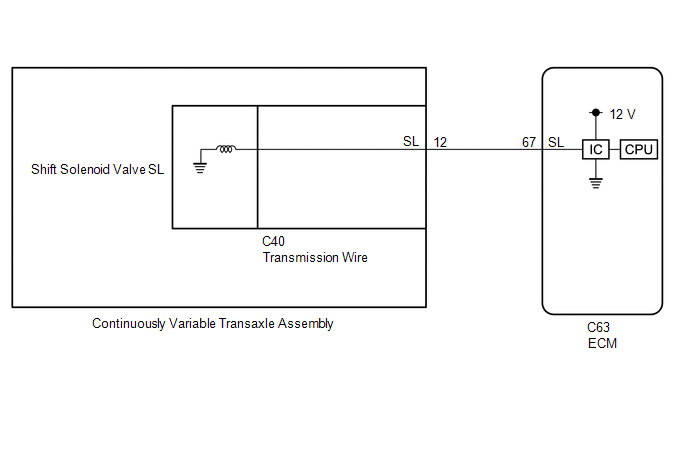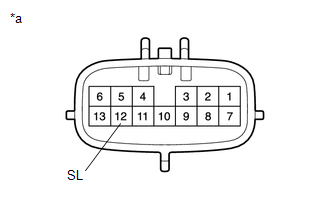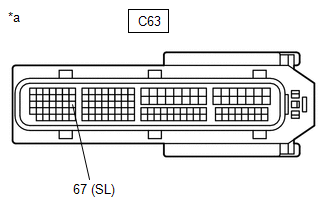Toyota CH-R Service Manual: Torque Converter Clutch Solenoid Circuit Low (P2769,P2770)
DESCRIPTION
Based on the signal received by the shift solenoid valve SL, the ECM uses the shift solenoid valve SLU to control the lock-up clutch pressure.
If there is an open or short in the shift solenoid valve SL circuit, the ECM stops sending current to the defective shift solenoid valve.
|
DTC No. |
Detection Item |
DTC Detection Condition |
Trouble Area |
MIL |
Memory |
|---|---|---|---|---|---|
|
P2769 |
Torque Converter Clutch Solenoid Circuit Low |
While the lock-up is operating, a short is detected in the shift solenoid valve SL circuit 1 time or more consecutively (1 trip detection logic). |
|
Comes on |
DTC stored |
|
P2770 |
Torque Converter Clutch Solenoid Circuit High |
While the lock-up is operating, an open is detected in the shift solenoid valve SL circuit 1 time or more consecutively (1 trip detection logic). |
|
Comes on |
DTC stored |
MONITOR DESCRIPTION
These DTCs indicate an open or short in the shift solenoid valve SL circuit. If there is an open or short in the shift solenoid valve SL circuit, the ECM detects the malfunction, illuminates the MIL and stores a DTC.
MONITOR STRATEGY
|
Related DTCs |
P2769: Torque Converter Clutch Solenoid (Shift solenoid valve SL) / Range check P2770: Torque Converter Clutch Solenoid (Shift solenoid valve SL) / Range check |
|
Required sensors/Components |
Continuously variable transaxle assembly Torque Converter Clutch Solenoid (Shift solenoid valve SL) |
|
Frequency of operation |
Continuous |
|
Duration Conditions |
1 times |
|
MIL operation |
Immediately |
|
Sequence of operation |
None |
TYPICAL ENABLING CONDITIONS
All|
Battery voltage |
8 V or more |
|
Time after Battery voltage 8 V or more |
0.5 seconds or more |
|
Write Inhibit |
permit |
|
Time after Write status forbiddance to permit |
0.5 seconds or more |
|
Ignition switch |
ON |
|
Time after Ignition switch OFF to ON |
0.5 seconds or more |
|
Starter |
OFF |
|
Time after Starter ON to OFF |
0.5 seconds or more |
TYPICAL MALFUNCTION THRESHOLDS
P2769:|
All of the following conditions are met: |
4 times or more |
|
Command to solenoid |
ON |
|
Time after command to solenoid OFF to ON |
0.008 seconds or more |
|
Solenoid terminal voltage level (Shift solenoid valve SL) |
Low |
|
All of the following conditions are met: |
4 times or more |
|
Command to solenoid |
OFF |
|
Time after command to solenoid OFF to ON |
0.008 seconds or more |
|
Solenoid terminal voltage level (Shift solenoid valve SL) |
High |
COMPONENT OPERATING RANGE
|
Shift solenoid valve SL |
Resistance: 11 to 15 Ω at 20°C (68°F) |
WIRING DIAGRAM

CAUTION / NOTICE / HINT
NOTICE:
- Perform initialization after replacing any parts related to the continuously
variable transaxle system.
Click here
.gif)
- Check that no DTCs are stored after performing initialization.
Click here
.gif)
- Perform the universal trip to clear permanent DTCs.
Click here
.gif)
HINT:
After performing repair, clear the DTCs and perform the following procedure to check that DTCs are not output.
- Drive the vehicle and confirm the lock-up on and off conditions according
to Road Test.
Click here
.gif)
.gif)
- Check for DTCs again.
Click here
.gif)
PROCEDURE
|
1. |
INSPECT TRANSMISSION WIRE (SHIFT SOLENOID VALVE SL) |
|
(a) Disconnect the C40 transmission wire connector. |
|
(b) Measure the resistance according to the value(s) in the table below.
Standard Resistance:
|
Tester Connection |
Condition |
Specified Condition |
|---|---|---|
|
12 (SL) - Body ground |
20°C (68°F) |
11 to 15 Ω |
| NG | .gif) |
GO TO STEP 4 |
|
|
2. |
CHECK HARNESS AND CONNECTOR (TRANSMISSION WIRE - ECM) |
|
(a) Disconnect the ECM connector. |
|
(b) Measure the resistance according to the value(s) in the table below.
Standard Resistance:
|
Tester Connection |
Condition |
Specified Condition |
|---|---|---|
|
C63-67 (SL) - Body ground |
20°C (68°F) |
11 to 15 Ω |
| NG | .gif) |
REPAIR OR REPLACE HARNESS OR CONNECTOR (TRANSMISSION WIRE - ECM) |
|
|
3. |
REPLACE ECM |
(a) Replace the ECM.
Click here
.gif)
.gif)
| NEXT | .gif) |
PERFORM INITIALIZATION
|
|
4. |
REPLACE CONTINUOUSLY VARIABLE TRANSAXLE ASSEMBLY |
(a) Replace the continuously variable transaxle assembly.
- When Not Using the Engine Support Bridge
Click here
.gif)
- When Using the Engine Support Bridge
Click here
.gif)
.gif)
| NEXT | .gif) |
PERFORM INITIALIZATION |
 Pressure Control Solenoid "J" Electrical (Shift Solenoid Valve SLP) (P2822)
Pressure Control Solenoid "J" Electrical (Shift Solenoid Valve SLP) (P2822)
DESCRIPTION
According to current control by the ECM, the shift solenoid valve SLP controls
primary pulley pressure in accordance with the requested gear ratio to perform gear
ratio changes.
...
 Pressure Control Solenoid "J" Performance or Stuck Off (P2820)
Pressure Control Solenoid "J" Performance or Stuck Off (P2820)
DESCRIPTION
According to current control by the ECM, the shift solenoid valve SLP controls
primary pulley pressure in accordance with the requested gear ratio to perform gear
ratio changes.
...
Other materials:
Toyota CH-R Service Manual > Oil Pressure Sensor: Installation
INSTALLATION
PROCEDURE
1. INSTALL OIL PRESSURE SENSOR
(a) Apply Toyota Genuine CVT fluid FE to the O-ring of the oil pressure sensor.
NOTICE:
If reusing the oil pressure sensor, check that the O-ring is not damaged.
(b) Using SST, install the oil pressure sensor to the continuously ...
Toyota CH-R Service Manual > Rear Trailing Arm: Components
COMPONENTS
ILLUSTRATION
*1
NO. 2 PARKING BRAKE WIRE ASSEMBLY
*2
REAR STABILIZER LINK ASSEMBLY
*3
REAR TRAILING ARM ASSEMBLY
*4
REAR STABILIZER BAR
Tightening torque for "M ...
Toyota C-HR (AX20) 2023-2026 Owner's Manual
Toyota CH-R Owners Manual
- For safety and security
- Instrument cluster
- Operation of each component
- Driving
- Interior features
- Maintenance and care
- When trouble arises
- Vehicle specifications
- For owners
Toyota CH-R Service Manual
- Introduction
- Maintenance
- Audio / Video
- Cellular Communication
- Navigation / Multi Info Display
- Park Assist / Monitoring
- Brake (front)
- Brake (rear)
- Brake Control / Dynamic Control Systems
- Brake System (other)
- Parking Brake
- Axle And Differential
- Drive Shaft / Propeller Shaft
- K114 Cvt
- 3zr-fae Battery / Charging
- Networking
- Power Distribution
- Power Assist Systems
- Steering Column
- Steering Gear / Linkage
- Alignment / Handling Diagnosis
- Front Suspension
- Rear Suspension
- Tire / Wheel
- Tire Pressure Monitoring
- Door / Hatch
- Exterior Panels / Trim
- Horn
- Lighting (ext)
- Mirror (ext)
- Window / Glass
- Wiper / Washer
- Door Lock
- Heating / Air Conditioning
- Interior Panels / Trim
- Lighting (int)
- Meter / Gauge / Display
- Mirror (int)
- Power Outlets (int)
- Pre-collision
- Seat
- Seat Belt
- Supplemental Restraint Systems
- Theft Deterrent / Keyless Entry
0.0124


.gif)
